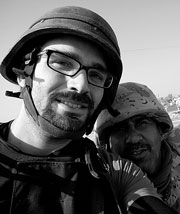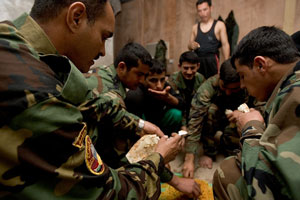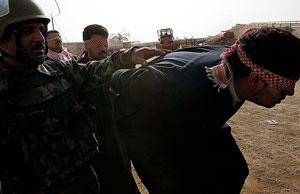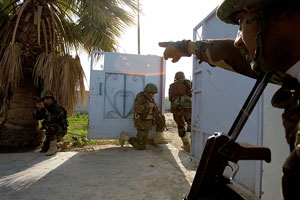 |
 | ||||||||||
Iraqi Special Police Commandos
March 2006 |
 |
|||||||||
|
When I landed at forward operating base Corregidor in Eastern Ramadi, I realized that in the upcoming months I would need to take advantage of the many opportunities presented and try to understand what was happening in this most troubled Iraqi region. Ramadi was indeed the front line of the "War Against Terror" in Iraq.
Arriving in Ramadi a few days before the Dec. 15 national elections, I was immediately briefed by the U.S. Second Brigade Combat Team in charge of the area. I was told that the Coalition Forces (the U.S. and its allies) were going to step back from securing the polling sites, which would mean that the polls were totally under Iraqi Government control. An Iraqi army armored company was deployed at Camp Tiger, just one kilometer from Corregidor, for a "show of strength" during the election week. I crossed my fingers, hoping for the best. The election actually went well.
"Burned by bad press" had been their reply to my embed request. What a coincidence to see them again in Ramadi on the eve of their most difficult deployment.
Going back to my point of contact, Captain Gramling at forward operating base Corregidor (101st Airborne Division), I asked him to whom I would need to talk in order to spend some time with the commandos. He said to ask the SPTT team (Special Police Transition Trainers from the U.S. Army). My heart sank because it had taken me more than a month of hard work with the 101st to gain the U.S. trainer's trust. I was afraid the Iraqis would never grant my request.
The Iraqi Ministry of the Interior was still insisting on their "no media" position. However, the Americans insisted that it was important to show the world what the Iraqi security forces were doing. The U.S. Army prevailed and I finally had my chance.
For the commandos, Ramadi was an environment that they had never before experienced. It was a very difficult and delicate area where the use of force and intelligence must be balanced. They wanted to protect the civilian population during firefights and raids that take place on the streets in full daylight.
One of the Iraqi commandos told me: "Things are very different from Baghdad, where we were mostly taking care of small-time criminals. In Ramadi the insurgency is well organized and has a strong leadership. In Baghdad there are only small gangs." Other commandos told me that, in addition, the only things they knew or heard about Ramadi they had learned from rumors or television; their unit was never trained for such a deployment. Actually, many of them were never trained at all.
An American soldier trains for many years with good equipment in a more than 200-year-old military tradition. Apparently an Iraqi commando is given an AK-47, maybe a uniform, a practically useless plastic helmet and is then sent to his unit facing missions from day one. Their body armor is mostly bought with their own resources. The Americans do supply the commando division but somewhere down the chain things are lost and/or finish up on the black market. The commandos are the first to say that there is too much corruption within the Iraqi Ministry of Interior.
The U.S. trainers tried to push the unit into training regularly but the Iraqi officers don't seem to want to struggle more than they have to. The idea that "training saves lives" has not made much of an impression on the Iraqi officer's minds.
The first day I arrived at Camp Tiger I was introduced to the Iraqi Battalion Commander who offered me lunch at the officer's mess hole. He seemed a bit worried to have me around but there was nothing he could really do about it. I explained to him my plan: follow one of his companies in their daily routine and operations. He was surprised to hear that. I guess that he would have found it much easier for me to rely on him for all my information. I then understood the difficulties that the U.S. trainers were facing with the Iraqi officers. The Iraqis were in charge of themselves. If they didn't want to do something they just would say "no" without presenting any real excuse.
While on operations with the American military of the 101st Airborne Division we would all know when the Iraqi commandos were in the area by their immediate use of fire power. Warning shots were usually fired instead of hand signals. If an Iraqi commando fired one round, Americans expected the others to follow suit — they usually did. In the beginning I thought maybe Ramadi really needed a strong Iraqi presence but the problem was really professionalism. Not only were they not trained for the job, they didn't really seem to take it seriously enough, as I soon learned.
I left the camp on foot with the Iraqi commandos one hour before sunrise and walked into the Mul'Hab. The commandos' mission was to draw out the insurgents and push them towards static American positions, where they would be destroyed by U.S. snipers, gun squads and air support. The mission was supposed to last about six hours, a very long time for these men.
Immediately, I noted a lack of security. Most of the military organizations that I have worked with considered security their first priority. Basically, if you are constantly thinking of protecting yourself, you're also protecting your unit as well, thus keeping the level of attention high enough to be able to take out the enemy if the group comes under attack.
After a few minutes of excitement, these men walked as though they were going to a party. I thought, "Well, it's their own country; they must feel more comfortable here than the Americans who are fighting in a foreign country." A few minutes later their Sergeant Major (the highest ranking non-commissioned officer in a battalion of 500 men) accidentally fired his AK-47 automatic rifle into the ground. The weapon's safety was on burst so three rounds were fired. He not only almost ripped off his own foot but also put at risk the soldiers and myself who were operating next to him.
Accidental discharges — or more precisely, "negligent discharges" — happen sometimes among the best military, but they are sporadic accidents, not everyday events. Just a few days before a soldier shot himself in his foot. Commandos have died because of the problem. (Apparently because Iraqi officers' approach to their troops is too soft on the men there is no real way to make improvements.)
After the accident, the unit relaxed even further, missing part of the objectives. It was now on a wide street with no cover: a perfect place for an ambush. Indeed, a car pulled up and the machine gunner at the window, having had time to aim and accurately fire on the men, pinned down the unit for several minutes. We all tried to find cover wherever we could and I ended up behind a small fuel tank with a U.S. trainer. No one was doing anything to stop the knee-level rounds that were flying way too close to us. I began to look around, realizing that I had to move out of there before a round hit the tank, or worse, me. I kicked in the door to a front garden that was just a few feet away. Some of us went inside and things began to turn around. I was sure that someone must have been hit.
Two commandos actually took fire in the leg and another one was shot twice in his back but luckily the rounds hit his armor plate and did not penetrate. I guess he was glad to have spent his personal money for the flack vest.
After the Americans evacuated the casualties the unit seemed to relax once more. Many commandos were literally hanging out on the corners and smoking cigarettes while their comrades were still exchanging fire with an enemy close by. The extraction of the commandos was chaotic and unorganized. The American trainers just gave up screaming and tried to provide as much security as they could until U.S. tanks and gun trucks rolled in. When they saw the American armored vehicles the commandos assured themselves that their mission was over.
After returning to the camp the Iraqi officers found nothing wrong with what had happened and only thought about lunch and rest. For them it was just another successful report to send to Division: "Mission accomplished, everything went well." I was very disappointed to find that the Ministry of Interior's supposedly elite force performed in such a terrible way. I left Ramadi after more than two months with many concerns about their own security forces. Things will get better though, "Inshallah" (God willing).
© Guy Calaf
Dispatches are brought to you by Canon. Send Canon a message of thanks. |
||||||||||
Back to March 2006 Contents
|
|



